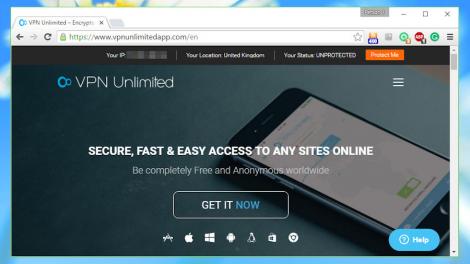

Some companies take a one-size-fits-all approach to VPNs, offering the bare minimum of products, but KeepSolid’s VPN Unlimited is different. Very, very different.
Forget the usual two or three plans. VPN Unlimited offers six, including weekly ($1.99, $1.89 if you pay by PayPal – that’s £1.45, AU$2.50) and monthly ($4.99 – that’s £3.85, AU$6.70), or you can plump for quarterly, yearly or even three-yearly. An annual subscription runs to $24.99 (£19, AU$34) and you can also sign up for a lifetime plan for $129.99 (£99, AU$173).
You’re able to build on any product by paying for ‘extensions’. These include your own personal VPN server (no other users, ever) from $6.97 (£5.30, AU$9.30) per month, a personal static IP address from $9.99 (£7.60, AU$13.30) per month (less chance of being blocked), or an "additional devices" plan which increases support from five simultaneous devices to 10.
The VPN plans are available on almost every device, with clients for Windows, Mac, iOS, Android, Linux and Windows 10 Mobile, and instructions for many other devices.
Every plan gives you access to 40+ servers, covering Europe, the US, Russia, Israel, Brazil, Malaysia, Singapore and more.
There’s a 7-day free trial to get you started, and also a 7-day money-back guarantee for a little extra security.
KeepSolid’s Terms and Conditions explain that the company logs only basic details about service activity, including session duration and bandwidth use. Otherwise there’s no routine logging of whatever a user might do online.
The one exception is when "users are suspected of activities, which are declared illegal by the laws of countries where the local KeepSolid Inc. servers are hosted", in which case "we may log information [not including private data], which is necessary to prove the user’s innocence and protect our service."
VPN Unlimited can be installed on a router, but the Terms and Conditions make it clear that you’re still only allowed to connect five devices to that router.
Any devices you connect are managed by the system, which only allows you to delete one of them per week. That’s handy for preventing abuse, but could be annoying in some situations.
Notably, most KeepSolid servers don’t support torrents. We also found a clause saying the company "may impose limits on KeepSolid Inc. services usage … or block certain kinds of usage … to protect users or the VPN Unlimited service". ‘May’ doesn’t mean ‘will’, and what this actually means isn’t clear anyway, but it could allow actions like throttling P2P traffic to reduce network load.
VPN Unlimited’s PC client opens with a clear overview of the service state. Your real and virtual IPs are displayed as addresses and plotted on a map, connection status is highlighted, and the number of days left on your current plan are visible at a glance.
One click connects you to the current server, or you can choose from a list of 40+ others. Basic details like the current server workload may help you make your choice.
There are a small number of tweaks available, including DNS leak protection and switching to TCP port 443 for greater protection, but otherwise there’s nothing complex to get in your way.
Getting connected occasionally took a fraction longer than average, but this was nothing we couldn’t live with, and there were no connection failures or errors during testing.
IPLeak didn’t reveal any clues about our real IP address, as the service was hiding our identity correctly.
This VPN service did well in our performance tests*, which is especially pleasing given the price you’re paying. Download speeds were only 12% down on our regular rate, and both latency and upload speeds were minimally affected (12% higher and 33% lower respectively).
KeepSolid’s choice of servers is lower than some, and you may not get the performance we saw with torrents, but for a more general purpose VPN the service does very well.
*Our testing included evaluating general performance (browsing, streaming video). We also used speedtest.net to measure latency, upload and download speeds, and then tested immediately again with the VPN turned off, to check for any difference (over several rounds of testing). We then compared these results to other VPN services we’ve reviewed. Of course, do note that VPN performance is difficult to measure as there are so many variables.
Source: Tech Radar